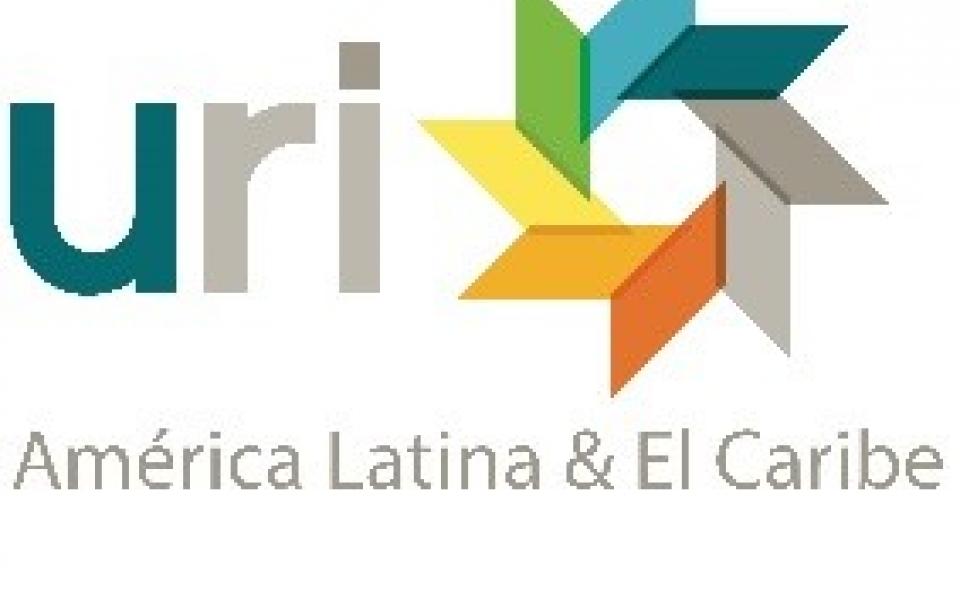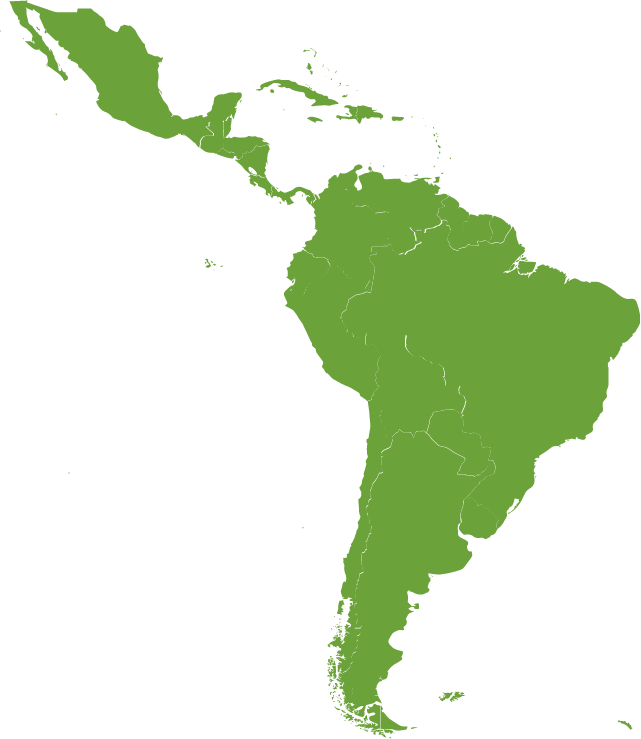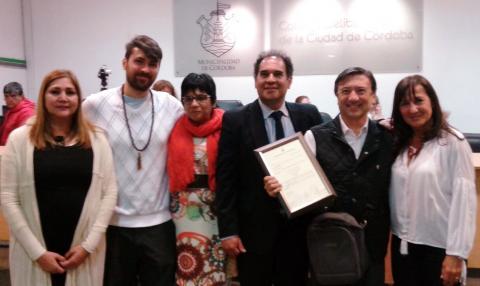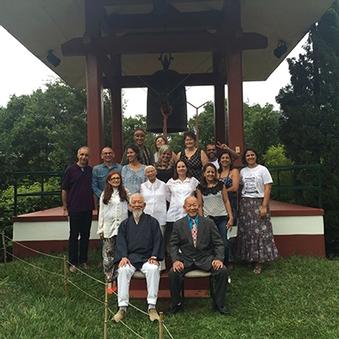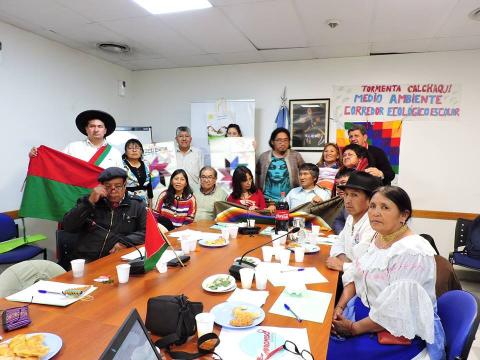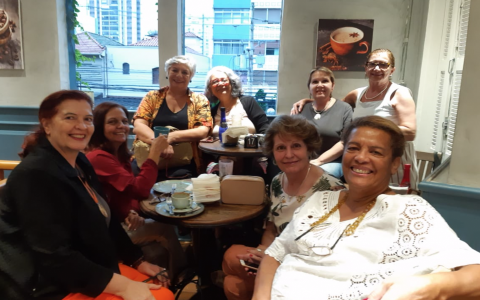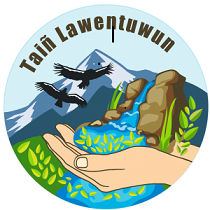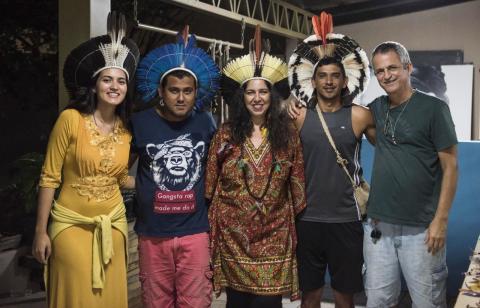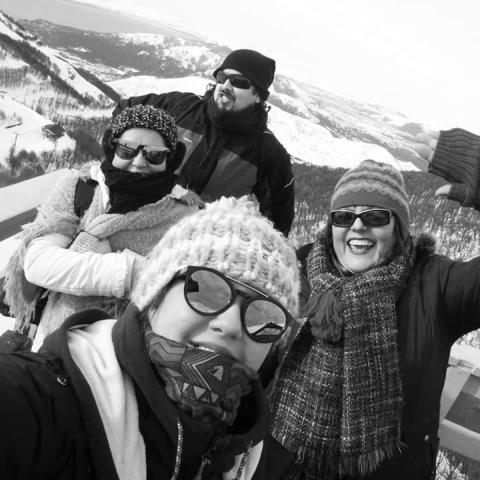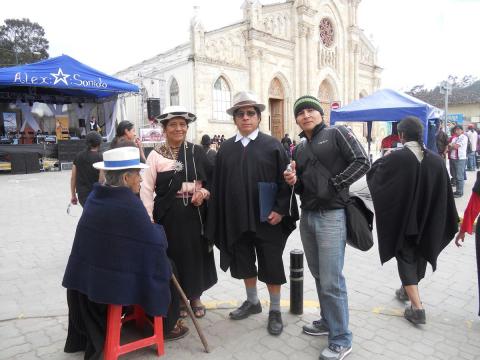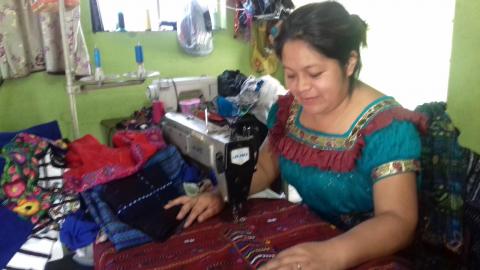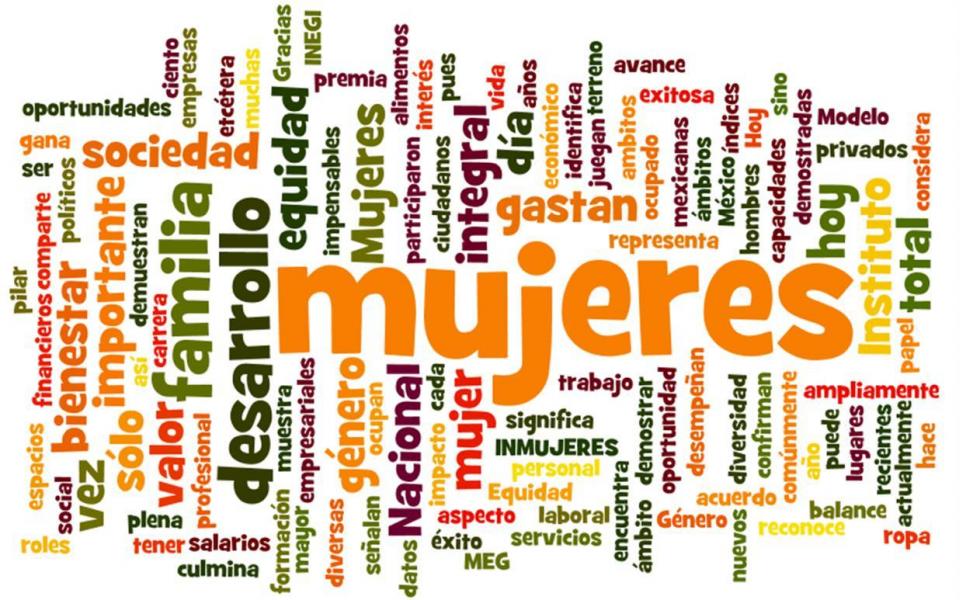
The Latin American and Caribbean Region developed within its Work Plan for this year 2020 a ZOOM Calling Calendar, in order to cope with the high costs of tickets, and promote Face-to-Face Meetings, using the technological tools for the well-being of human beings, in this case, the joy of sharing among the members of the CCs the beautiful work that they have been carrying out in their local communities, together with common celebrations that we share with the Global URI community such as: World Week of Interreligious Harmony , International Women's Day, The Golden Rule, Earth Day, International Peace Day, International Indigenous Women's Day, World Children's Day, International Human Rights Day.
Last Thursday, March 12, 2020, fifteen (15) women, from seven (7) countries of the Region, representatives of Cooperation Circles and some of them were also members of the Global Council or Global Staff for around two (2) hours, they shared in a pleasant way their feminine experiences and their experiences, dreams and works around the empowerment of women.
PARTICIPANT COOPERATION CIRCLE COUNTRY
1 Marina Tirado Dialogue Venezuela
2 Yanina Arias Yacu Yura Argentina
3 Marcia Jaramillo Melirrewe Mogen Chile
4 Rosalía Gutiérrez Indigenous Peoples of Argentina / Former Argentina Global Trustee
5 Celia Palma Fe Menina Brazil
6 Isabel Medeiros Caminhos Da Terra Brasil
7 Susana Bello Unakita Argentina
8 Rosadelia Quihzpe Samay Ecuador
9 Vilma Palax The Descendants of Guatemaya Guatemala
10 Luisa Pereira MOPSyC Argentina
11 Fany González Mukua Panama
12 Salette Aquino Brasilia / Global Trustee Brazil
13 Sofia Painiqueo Aflaiai / Global Trustee Chile
14 Enoé Texier Dialogue and CISEI / Regional Coordinator Venezuela
15 Adriana Reyes Dialogue and CISEI / General Assistant of the Regional Coordination Chile
We began the meeting with the Initial Blessing that Sofía Painiqueo raised to the universe, to the ancestors, to the strength of the woman and the role that she must play in this Time of humanity to guarantee physical, mental and spiritual health.
Salette shared how exciting her celebration of International Women's Day was in Brasilia, where she participated in a massive and very beautiful event attended by 3,500 women from all the states of Brazil and from 14 countries in the Latin American region.
Rosalía talked about that there is not a single women's day, the fight includes indigenous and non-indigenous women. She works with her community every day to help raise women's self-esteem. Unfortunately, there are many femicides that occur in Argentina, she told us that at this day, it is important to talk about the abuses that are experienced, not only about the beautiful things. Their participation is active from the indigenous vision that they share with everyone.
Rosadelia after giving a special greeting to all women, extended to all the members of her CCs, comments that CC Samay has, among its projects, visiting schools and different communities to teach workshops related to the prevention of domestic violence, alcoholism, drug addiction and care for the environment. Apply for financial support for the logistics of mobilization and the acquisition of materials to carry out the project.
Sofia highlighted the importance of International Women's Day and commented that on March 8 they elected her as President of their community, therefore, in the Public Act she took her word of reflection to women, about the self-recognition of their importance, and there she pointed out that her fight is together with indigenous and non-indigenous women, without exclusion. She urged us to give importance to the celebration of September 5 "International Day of Indigenous Women", highlighted the value and courage they have to claim their rights, hence the use made of them by political parties that they use as "cannon fodder". The value of the indigenous woman is linked to her worldview, her connection with nature, her daily life is still sacred, we believe in the earth, she says, and we ask the energies to protect us in the daily struggle and support us, to engage and organize our people.
Marina talked about the difficulties that the members of her CC had to overcome in order to carry out the beautiful activity of the World Week of Interreligious Harmony due to the humanitarian crisis that Venezuela is suffering. She shared what the celebration of Women's Day was by attending a “Carmina Burana” concert with approximately 8,000 attendees, she warned that the majority were grandmothers, mothers, aunts, daughters, nieces… and many senior women stood out, who They are very lonely due to the great exodus of young people who have fled due to the general crisis in the country. She indicated that women have to strengthen unconditional love to continue supporting the family. She commented that at the end of the Concert, the invited pianist –a young Venezuelan virtuoso- performed two pieces of Teresa Carreño, a valuable Venezuelan artist from the beginning of the 19th century, who opened a field for women taking her music around the world. She told us that this inspired her, and invited us to: “retake the Teresa Carreño that we all carry inside, we are innovative, we challenge difficulties… let's take up the strength that our hearts give us to do things for the happiness of ourselves, to heal, to draw the strength of unconditional love. "
Marcia recounted the beauty of the celebration of Women's Day in her community because in the Cordillera, remote area, she participated in the lifting of a Machi (woman healer), Catalina, 18-year-old girl, a student of Machi Aniceto, who from now on You will have a mission to bring health to her community. That young Machi is a woman who is going to be a bridge among the people. All attendees, including myself, “put our strength to work healing. There I went to put my strength in representation of the women who were, those who could not come, those who fought and fight for the healing issue. I like educating and forming values, of opening our hearts and thoughts as women to show in these Meetings what is happening in each community.”
Susana shared her experience as a new Unakita CC that participated in an event called "The Old Women's Revolution". How we all want to live old age: indigenous people, trans women, priestesses, housewives, workers, etc. ... She indicated that she calls us to unite, beyond religions and political parties, to act with the right we have to enjoy recreation, spaces for us, to live with the care we need. Its Circle of Cooperation is helping women to set limits, to overcome their fears, to empower them to deal with toxic relationships with children, partners, etc. Educate elderly women to reclaim space even among ourselves.
Yanina talked about the respect for nature that they as indigenous women cultivate and teach their children, to recover that value that the conquerors took from us, she says. We have to recover it in our people, in our youth. In our community and our CC, women work together with men in this recovery, we try to make work equal in the mission of living with nature guiding us, helping us with remedies and plants.
Isabel told us that on March 6, she presented URI within a new group made up of people who dance, make music, circus ... and that those people were very interested in the work of our interfaith network. She celebrated Women's Day with the reunion with a friend, whom she had not seen for 25 years, in the midst of long conversations they were able to relive experiences lived together where many emotions emerged, which they shared and also enjoyed.
Celia told us that to celebrate that day, they met at a friend's house, to share a coffee, chia, and some food. There they talked for several hours, about the Women for peace, beauty project ... They commented that there were many problems that people and children were facing, such as the case of Northeast Brazil where it is normal for men to have families of up to four women, thirty children, grandchildren ... They talked about coming together to do this Project and share their skills.
Luisa, who was present all the time on the call but with a very low internet signal and unable to speak, sent these notes of what she wanted to share with us that day: “On March 8 while we organized to attend the Women on Monday, March 9, we separated time to talk about the origins of the women's struggle that dates back to 1908. Of course, that day is a day for women in general in search of rights. But we indigenous women have another day, it is in September and with other claims.
For Indigenous women it was a day to give support like any other day, the only good news for our sisters is that an indigenous sister was recognized as Outstanding Indigenous Woman of 2020 for her work in the communities. In contrast to this mention, other indigenous sisters in the communities of the province of Salta are dying from malnutrition and their babies are dying from diseases due to contaminated water, in other communities they are dying from lack of water and food for their nutrition. , all this is a consequence of the clearing for the soybean plantation. ”
Fany who communicated via WhatsApp, because her inability to connect, she sent us the words she wanted to share: “We in Panama on International Women's Day first met to remember our leader, a woman fighter for indigenous women in our community: Fany Avila, with the words that she always emphasized to us ´We indigenous women must always preserve our identity and transmit our knowledge to our children so as not to lose our tradition´. It was very pleasant and comforting because many women witnessed what changed their lives and what they could do with Fany's guidance by listening to her and following her advice, enterprising women who remembered the importance of that struggle. Many good ideas came up, including giving continuity and a new impetus to the Project "Kuna Art School for the design and creation of the Mola", which CC Mukua has advanced to teach girls in the community to sew the molas, empowering them so that they continue the tradition of artisans women who have contributed in this way since ancient times, to the domestic economy.
Vilma
“As women we are extraordinary beings, we fight for our goals and dreams, we have demonstrated to the world our capacities as professionals, mothers, friends, lovers, sisters and colleagues that make a better world. At URI, we can see the participation and miracle that our sisters do: Enoé, Eugenia, Alice, Salette, Sofía, and many more who are our leaders and show us that as women we can go far helping our people, they are our clear examples. For this very special day, I want to congratulate each one of us and thank you for the contribution of each one to humanity, to be a better world ”.
Something beautiful happened in this encounter, at one point the grandchildren arrived: Emma from Enoé, Gael from Salette, Dandara from Celia, Wünelve Likan from Sofia and Yanina's baby named Valentino. The new generations were present to reaffirm our desire and commitment as Latin American women for the future of our children.
